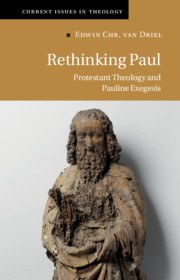Book contents
- Rethinking Paul
- Current Issues in Theology
- Rethinking Paul
- Copyright page
- Dedication
- Contents
- Preface
- Acknowledgments
- 1 The Narrative Substructure of Paul’s Thought
- 2 Justifying Faith
- 3 Jesus’ Faith
- 4 The Return of the Faithful One
- 5 Atoning Faithfulness
- 6 Resurrection and Justification
- 7 The Pauline Ordo Salutis
- 8 Church and Salvation
- 9 Christ and History
- 10 History and Israel
- 11 The Narrative of Paul’s Gospel
- 12 Doing Pauline Theology
- Epilogue
- Scriptural Index
- Subject Index
6 - Resurrection and Justification
Published online by Cambridge University Press: 06 May 2021
- Rethinking Paul
- Current Issues in Theology
- Rethinking Paul
- Copyright page
- Dedication
- Contents
- Preface
- Acknowledgments
- 1 The Narrative Substructure of Paul’s Thought
- 2 Justifying Faith
- 3 Jesus’ Faith
- 4 The Return of the Faithful One
- 5 Atoning Faithfulness
- 6 Resurrection and Justification
- 7 The Pauline Ordo Salutis
- 8 Church and Salvation
- 9 Christ and History
- 10 History and Israel
- 11 The Narrative of Paul’s Gospel
- 12 Doing Pauline Theology
- Epilogue
- Scriptural Index
- Subject Index
Summary
This chapter contrasts the traditional Protestant understanding of justification with two rival ways in which contemporary exegetes conceive of the anatomy of God’s justifying act: the salvation-historical proposal of N. T. Wright and the apocalyptic reading of Douglas A. Campbell. Like the reformers, N. T. Wright understands justification as a forensic event. Unlike them, Wright thinks about justification primarily in ecclesiological and eschatological categories. Justification is to be declared a member of the eschatological covenant family. Douglas A. Campbell thinks of justification as a saving rather than a juridical account. To be justified is to be set free and delivered. The chapter argues that, on close analysis, Wright is not as far from Campbell’s position as is usually thought - not least by Wright himself. Wright’s description of what actually happens in justification goes far beyond a juridical declaration. On both the salvation-historical and the apocalyptic account, justification is centered on resurrection and thereby the result of an eschatological divine intervention.
Keywords
Information
- Type
- Chapter
- Information
- Rethinking PaulProtestant Theology and Pauline Exegesis, pp. 161 - 188Publisher: Cambridge University PressPrint publication year: 2021
